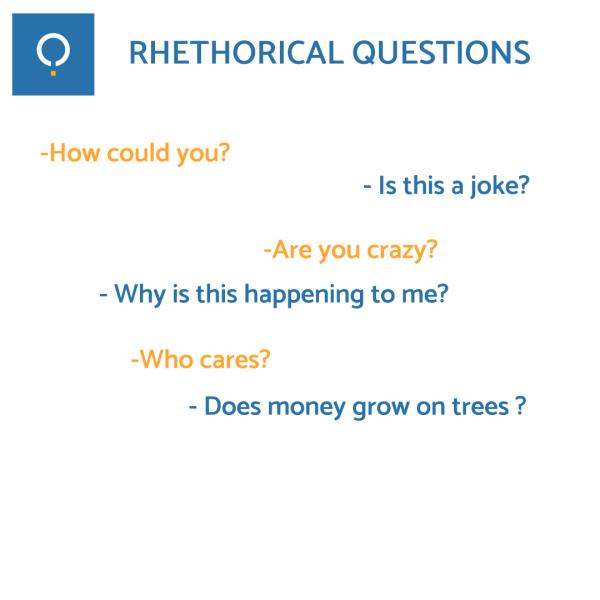What is a Rhetorical Question? With Examples


Rhetorical question is a form of speech that is said in the form of a question, but a reply is not expected of it. Although this kind of question is not meant to ask something or find a reply, it sometimes aims at starting a conversation or drawing attention. When a rhetorical question is asked, the listener is often expected to understand the message intended without giving an answer. For instance, if your boss asks you ‘do you know what time it is?’, he does not want you to tell him the time, but he wants to point out that you are late. This oneHOWTO article intends at explaining what's a rhetorical question.
What a Rhetorical Question actually is
In general terms and in English grammar, a rhetorical question is the one that is asked without any expectation of an answer. This kind of question may be the one that has a very obvious answer, or that does not have an answer at all. Although this question does not need to be replied, it is often asked to make a statement, draw attention to a point, to persuade, or to create a literary effect in a sentence. In many cases, rhetorical questions are self-evident, and are used to add style and persuade. In broad terms, a person asks a rhetorical question just to create an effect. Either he is already aware of the answer, or he does not expect a straightforward answer. Normally, this kind of question encourage the listener to think about his or her own beliefs or thoughts rather than actually speaking out an appropriate reply.
Types of Rhetorical Question
There are different types of rhetorical questions which may be asked in different ways for different intentions. Let’s have a look:
As a negative assertion
This type of rhetorical question is often intended to pose a challenge against the listener. In most cases, this kind of question is difficult, or even impossible to answer. For example, what have our parents ever done for us? In this instance, the question does not need a reply, but it is intended to make a negative assertion against the speaker’s parents. The speaker intends to say that his parents have never done anything for him. When posed with negative assertion, the rhetorical example functions as a positive with a sarcastic flavor.
As a metaphor
A rhetorical question may be used for an already asked question as a metaphor. In this type, the rhetorical question is viewed as a rhetorical affirmation, in which another question is asked with an intention to express obviousness or certainty of a situation. This kind of question is often humorous, with an equally obvious answer.
Other types
Sometimes, the answer of a rhetorical question is a wish that the situation were not so. Such as, ‘how many people will have to die before the Indo-Pak relations improve?’ Another type of rhetorical question is an expression of doubt. For instance, ‘Is it?’, ‘Did he?’ etc. Sometimes, a rhetorical question may be used to finalize a decision or end a debate, like ‘why not?’
Examples of Rhetorical Questions
Now that you know different types of rhetorical questions, you will have a clearer picture by going through a few examples. Here they are:
Rhetorical question with an obvious answer
These questions have very obvious answers, probably because they talk about very common facts, or the answer is already present in the context of placing the question. Such questions are often asked to put emphasize on a particular point only. Some examples of such rhetorical questions are:
- Do you plan to be a failure your whole life?
- Do fish swim and birds fly?
- Are you mad?
- Does this discussion have a point?
- Do you know a girl more beautiful than me?
- Is this a joke?
- Are you serious?
Rhetorical questions that do not have any answer
Some questions are just asked to make a point or to make a sarcastic comment, and they have no reply at all. Some of such questions are:
- Do you know the meaning of life?
- Why are we still living together?
- Is there no chance?
- Why God always tests me?
- Who cares?
Rhetorical questions that need to be answered
There are certain questions that are obvious to answer but still need to come with a reply. Such questions are:
- Can I punch you in the face?
- Do you want to become a loser when you grow up?
- Do you want me to fire you?
- Does money grow on trees?
Most of the times, it is quite easy to identify a rhetorical question, considering the point at which it is asked in a sentence. It is usually asked immediately after making a comment, and is used to state it’s opposite. Often, the idea is to bring attention to a particular point.

Other Forms of Rhetorical Questions
Based on their usage, relevance and figure of speech, rhetorical questions can be divided into some other different categories as well, including the following:
- Hydophora: It is a figure of speech where a person asks a question and then answers it himself immediately. Usually, he asks a question in a paragraph, and then uses another paragraph next to it to provide its answer. For example, are we happy in this marriage? Of course. Not only happy, but we are in so much love that we can fight the whole world for each other.
- Anthypophora: This figure of speech is often intended by a person to argue with oneself. It is a rhetorical question that a person asks when no one is listening or no one is answering. Usually, it is used to create a deliberate effect. A writer may use anthypophora to neutralize his critics, or to end a debate with appearing neutral. For instance, what should I do? Should I leave this job? Am I needed here any more? I don’t think so. I’ve decided, I’ll resign very soon if things don’t get better.
- Epiplexis: It is a type of rhetorical device in which the speaker tries to reproach his audience with an aim to convince or incite them. It is an interrogative form of speech in which a question is often asked to reproach or rebuke a person, instead of eliciting an answer. It is a kind of argument in which someone tries to shame his opponent by bringing attention to a single perspective. For example, ‘do you have an allergy to books?’, ‘are you going to be a loser all your life?’, ‘do you think you are the master of this world?’ etc.
- Erotesis: It is a figure of speech in which someone asks a question with a confident expectation of the answer being affirmative or negative. For example, ‘am I here to be your servant whole life?’, ‘am I not your real son?’ etc.
Summary
To summarize, a rhetorical question is a question which is used to make a point and does not expect a reply. This interrogative sentence does not necessarily ends up with a question mark, but may also end up with a full stop, exclamation mark or any other punctuation mark. Sometimes, it is also used to bring attention to a point and convey the intended message. Most of the times, this figure of speech does not have any literary significance, but it is simply used to convey a message or make a point to let the listener understand the speaker’s intention.

If you want to read similar articles to What is a Rhetorical Question? With Examples, we recommend you visit our Learning category.






